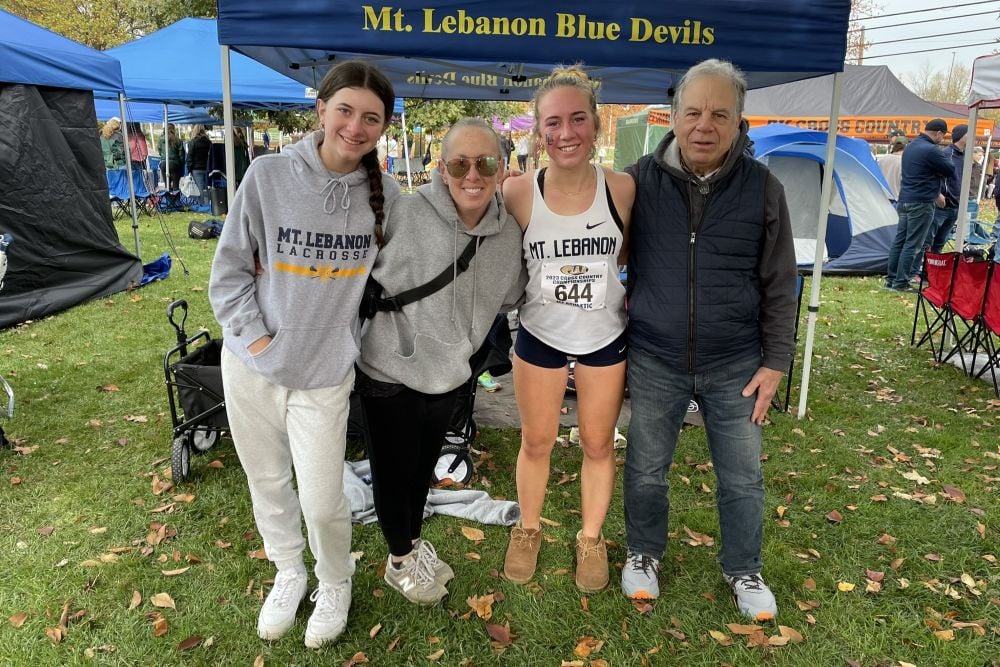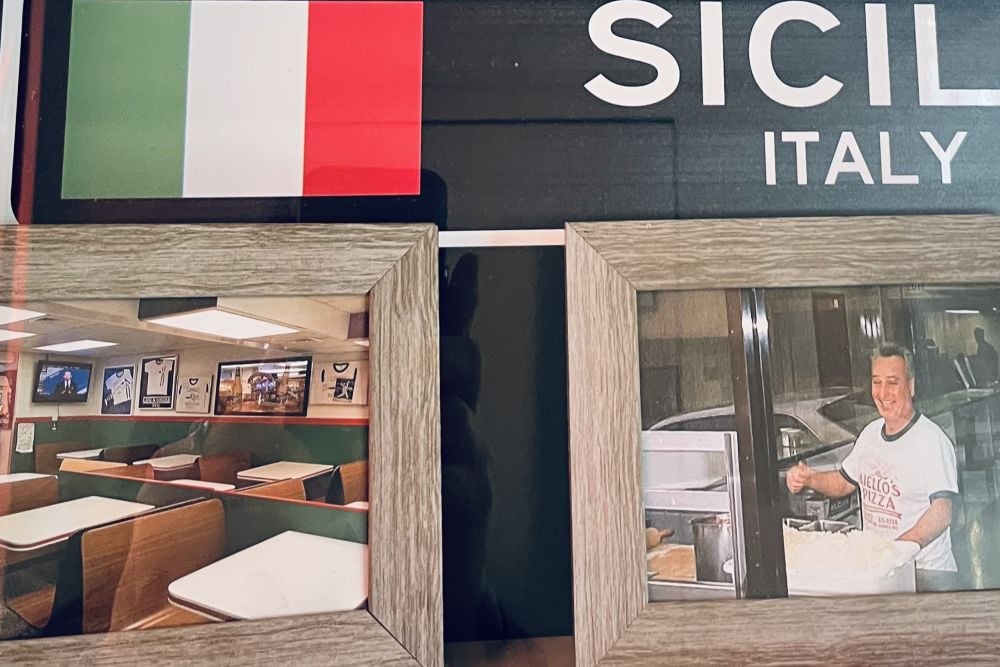Pittsburgh Restores Program to Curb Feral Cat Population Boom
Local trappers, advocates relieved after months of increased stray animal intakes.
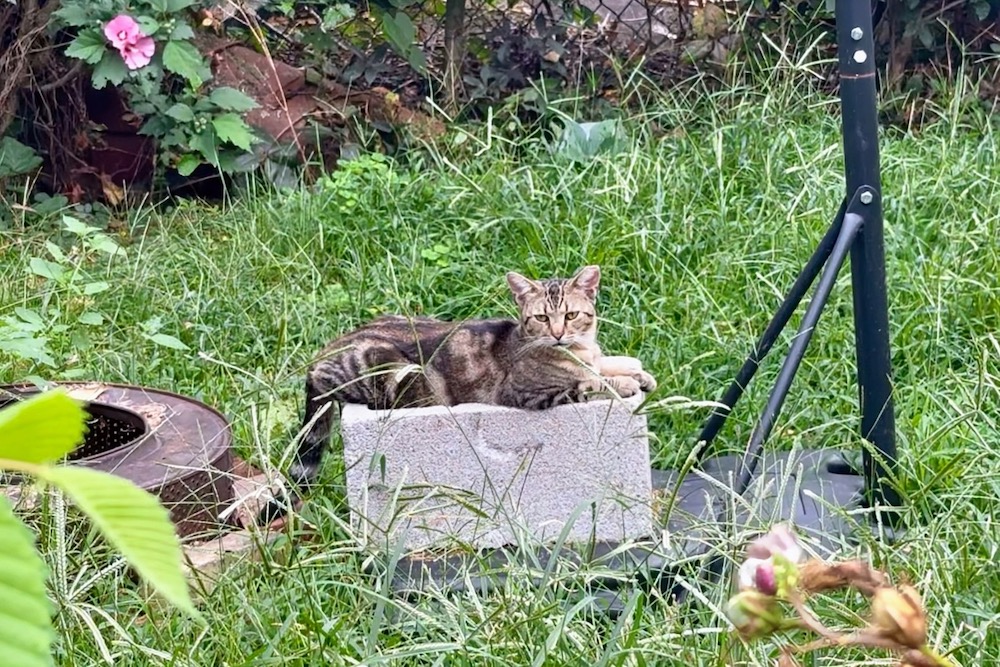
A STRAY AND FIXED CAT SITS ON A CEMENT BLOCK IN A BACKYARD ALONG MOUNT HOPE ROAD IN BRIGHTON HEIGHTS. COMMUNITY MEMBERS HAVE BEEN WORKING TO SPAY AND NEUTER A COLONY WITH ABOUT 30 CATS. | PHOTO BY ERIN YUDT / NEXT GENERATION NEWSROOM
A newly restarted program in Pittsburgh will help control cat colonies like one in Brighton Heights with more than two dozen cats.
City officials launched the restructured spay and neuter voucher program this week, which now offers two online applications — one for pet cats and dogs and a separate one for
“community cats” (also known as feral or stray cats).
Related: Pittsburgh Set to Reopen Free Spay and Neuter Program for Non-Feral Cats, Other Pets
Residents may apply for two pets in a calendar year and are not to exceed a total of five vouchers in five years. Those who wish to participate in the community cat program must live in the city and register as a trapper through the online application.
Gabrielle Sikora, of Brighton Heights, said she plans to register as a trapper. About a month ago, Sikora started trapping and fixing cats along Mount Hope Road.
“I was just chatting with my mailman, and he mentioned Mount Hope Road, how it had a really bad colony problem right now with feral cats,” Sikora said. “I got there and there were like 30 cats on the streets, and so panic definitely set in.”
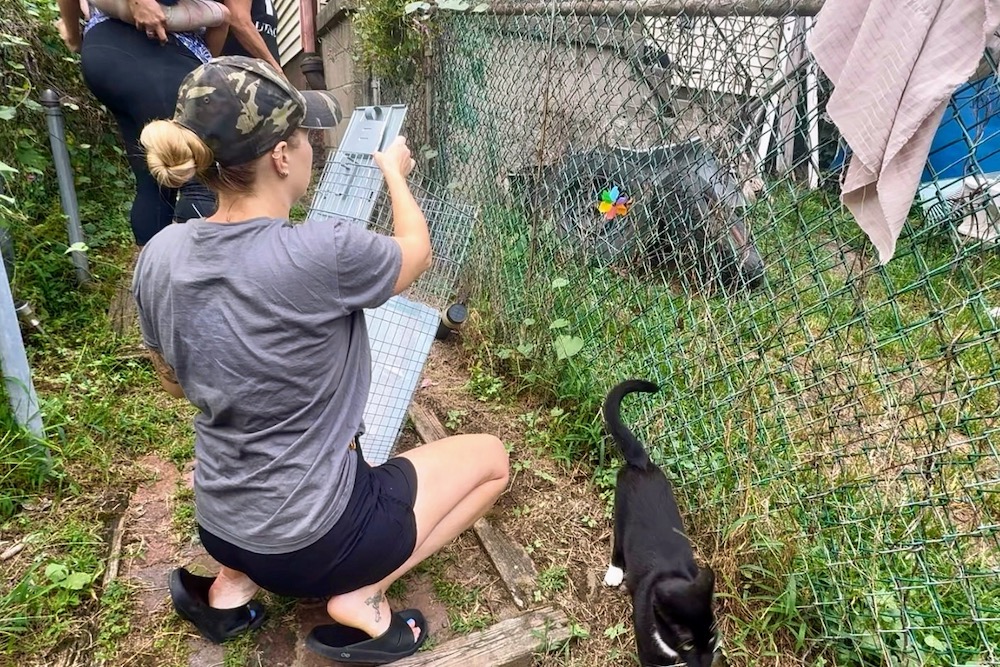
GABRIELLE SIKORA SETS A CAT TRAP IN A BACKYARD ALONG MOUNT HOPE ROAD IN BRIGHTON HEIGHTS. SHE HAS SPAYED AND NEUTERED 10 CATS FROM THIS PROPERTY IN THE LAST MONTH. | PHOTO BY ERIN YUDT / NEXT GENERATION NEWSROOM
Trappers must certify that the cats are trapped within city limits and are intended to be re-released in the same area or into another colony within the city. They are allowed to apply for up to 30 vouchers in a year. Additional slots may be approved on a case-by-case basis.
Sikora, with the help of a few neighbors, has been able to trap and fix 10 cats. She said the relaunch of the program will help take the burden off of these neighbors and many other cat colony caretakers.
“I think that’s a huge part of this is not just for animal welfare, but the welfare of the citizens of Pittsburgh,” Sikora said. “These are empathetic, loving people that want to help these animals but may not have the means or the transportation.”
Sikora also said she hopes to see continued funding for the spay and neuter program.
“The second you stop [spaying and neutering] and one unfixed cat comes along, you’re starting the whole project over again,” Sikora said. “It’s something we need to maintain and be on top of. This colony could come back next year if we don’t keep up with it, which would be so sad and such a disservice to the animals and the citizens.”
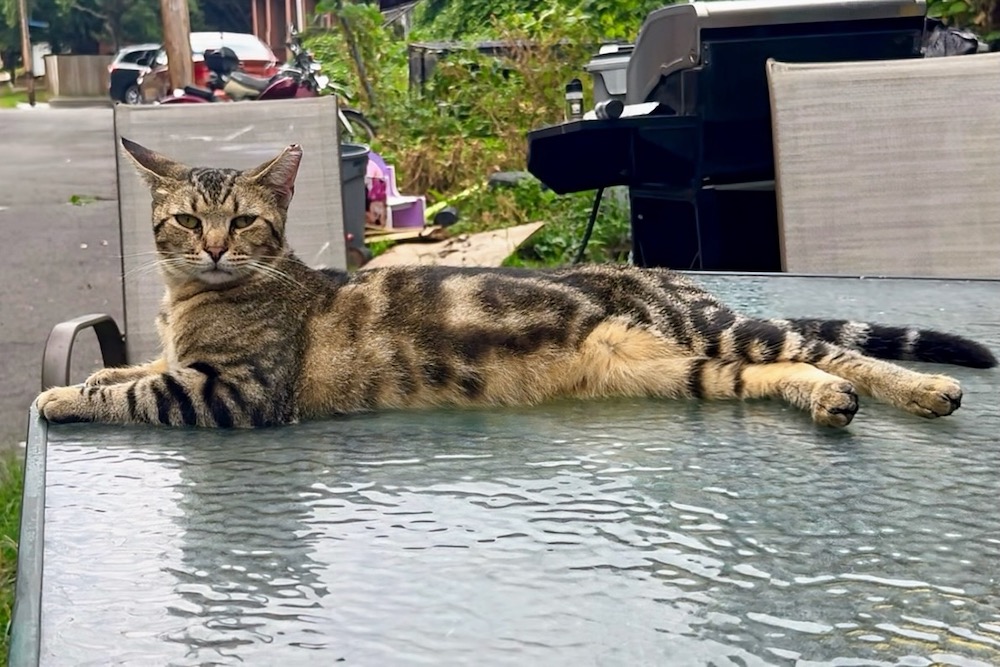
A STRAY AND FIXED CAT LAYS ALONG A TABLE OUTSIDE A HOUSE ON MOUNT HOPE ROAD IN BRIGHTON HEIGHTS. THE CAT IS ONE OF 10 COMMUNITY MEMBERS HAVE FIXED IN THE PAST MONTH. | PHOTO BY ERIN YUDT / NEXT GENERATION NEWSROOM
Spay and neuter surgeries will still be handled through Humane Animal Rescue of Pittsburgh. The group is under contract with the city to provide services for the program, awarding the rescue $70,000 annually for 2025-27.
In 2023, 974 dogs and cats were spayed or neutered through the program, according to an annual report from the city. This number went down to about 100 in 2024, Humane Animal Rescue of Pittsburgh Executive Director Dan Cody said.
The drop in spays and neuters happened after the program was paused in February 2024, then restarted a month later to include only feral cats. Feral cats have not been part of the program this year, said Emily Bourne, a spokesperson for the City of Pittsburgh, in August.
City officials paused the program last year because pet owners outside the city were applying for vouchers, according to Schmidt. The new applications must include two recent bills or other official mailings that include the applicant’s name, city residential address and date.
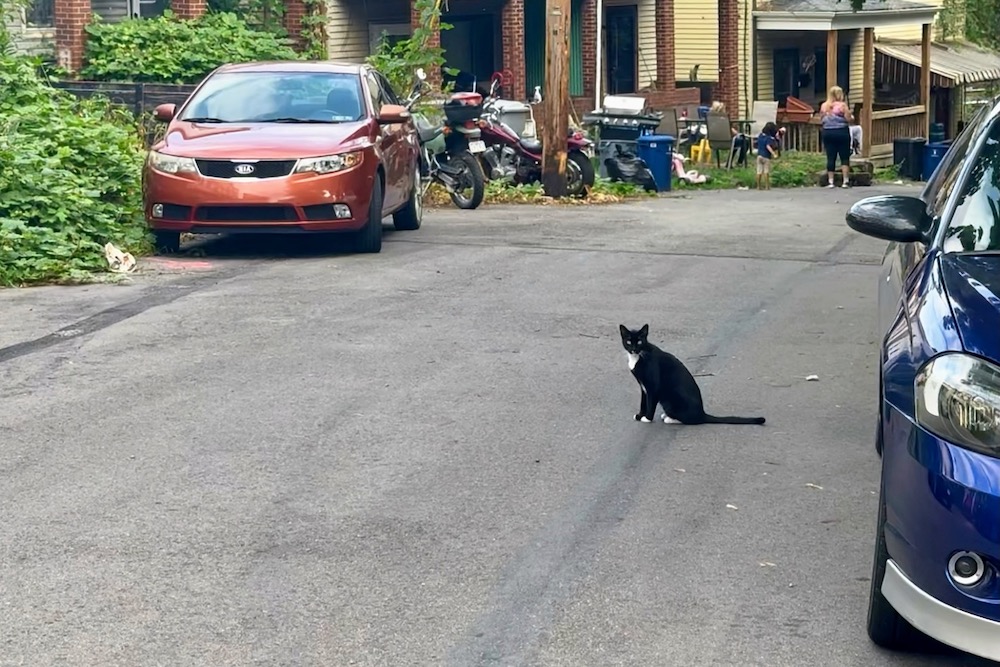
A CAT SITS ALONG MOUNT HOPE ROAD IN BRIGHTON HEIGHTS. COMMUNITY MEMBERS HAVE BEEN WORKING TO SPAY AND NEUTER A COLONY WITH ABOUT 30 CATS. | PHOTO BY ERIN YUDT / NEXT GENERATION NEWSROOM
“Humane Animal Rescue of Pittsburgh is proud to continue our partnership with the City of Pittsburgh on its spay and neuter programs,” Cody said. “Expanding access to these services is one of the most effective ways to reduce pet overpopulation and support healthier communities.”
Cody said there are no outstanding approved spay and neuter vouchers from before the program’s pause. There was a brief “backlog” of these surgeries for adopted animals while two veterinarians were off, but the rescue said they are “caught up” and back to a “normal flow.”
Another trapper who is a little hesitant to register with the city is Anna Montano. She mainly traps cats on the North Side.
“If [the city is] saying trappers can do 30 cats, then it just seems like it’s going to be a scheduling nightmare,” Montano said.
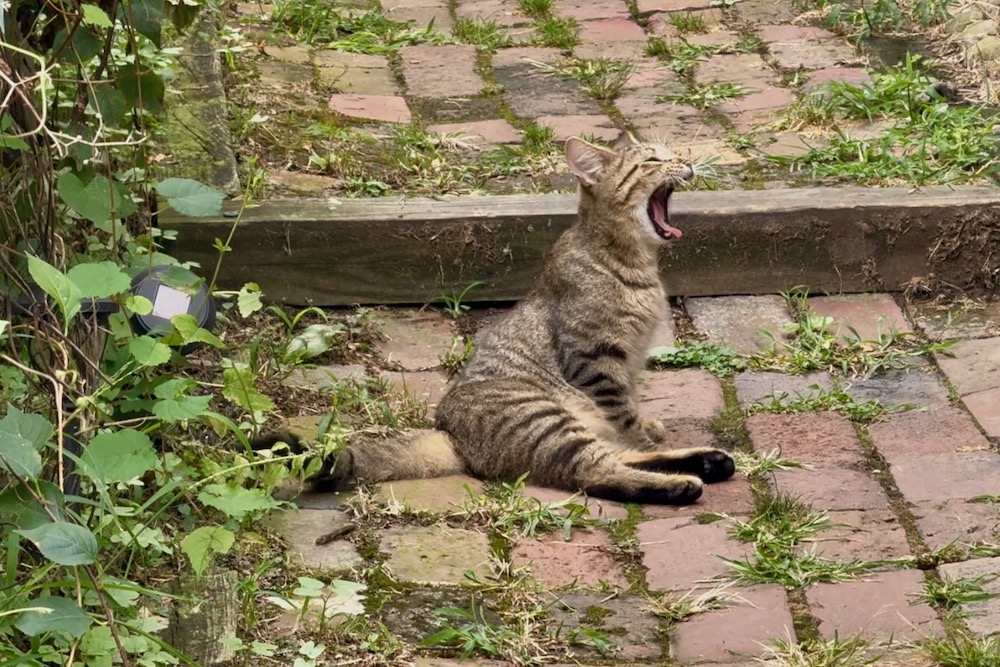
A STRAY CAT IN BRIGHTON HEIGHTS YAWNS AS COMMUNITY MEMBERS SET TRAPS. RESIDENTS SAY THEY HAVE SEEN AN UPTICK IN STRAY CATS THIS SUMMER. | PHOTO BY ERIN YUDT / NEXT GENERATION NEWSROOM
Montano also said she has concerns for when she does trap feral cats, as it is much harder to hold them for a longer period of time.
The city’s website states that cats that are trapped with the intention of fostering or adoption may not use the spay and neuter program.
“Sometimes a cat seems kind of feral because they’re afraid, and then after a couple days of decompressing, this cat might actually be workable,” Montano said. “But if they’ve already been fixed under the program, does that mean you’re going to get in trouble?”
Montano said she believes the relaunch is a step in the right direction but worries it may not be enough.
“I want to see how it goes; I hope it doesn’t get paused again,” Montano said.
More information on program requirements can be found on the city’s website, and additional questions can be emailed to spayneuter@pittsburghpa.gov.
Erin Yudt is a reporter with Next Generation Newsroom, part of the Center for Media Innovation at Point Park University. She most recently was a multimedia content producer and digital reporter at WKBN in Youngstown and is a graduate of Point Park University. Reach her at erin.yudt@pointpark.edu.
NGN is a regional news service that focuses on government and enterprise reporting in southwestern Pennsylvania. Find out more information on foundation and corporate funders here.




